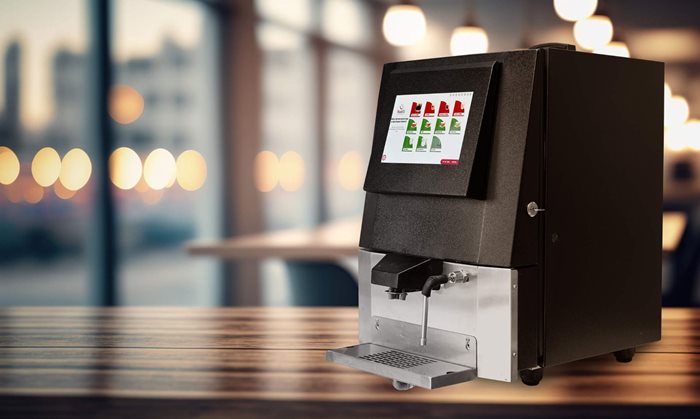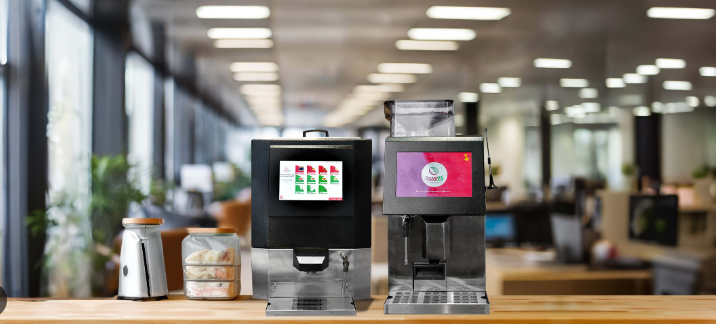The way people work, interact, and consume services in offices and public spaces is undergoing a fundamental transformation. Traditional office setups are giving way to flexible work environments, and public spaces are no longer just transit areas but hubs of productivity and social engagement. Businesses that cater to these evolving needs have a unique opportunity to redefine their models and create innovative revenue streams.
This article explores a new business model tailored for offices and public spaces, focusing on subscription-based vending services, AI-driven smart infrastructure, experience-based workspaces, and hybrid monetization strategies. We will delve into untapped opportunities that can revolutionize how companies operate in these environments while providing unparalleled value to customers.
The Subscription-Based Coffee Vending and Snack Model
One of the biggest expenses and time sinks for office workers is purchasing coffee and snacks daily. A subscription-based coffee and snack model for vending machines can address this issue by offering unlimited access to premium products for a fixed monthly fee.
How It Works:
- Employees or visitors subscribe to a monthly plan (e.g., $20 for unlimited coffee, $40 for premium coffee and snacks).
- A digital platform integrates with vending machines, allowing users to scan QR codes or use NFC-enabled ID cards.
- Smart vending machines track consumption, optimize stock levels, and ensure a seamless experience.
Why This Model Works:
- Predictable Revenue Stream: Unlike pay-per-use vending machines, subscription models generate recurring revenue.
- Increased Customer Loyalty: Employees and visitors become repeat customers since they’ve already committed financially.
- Bulk Purchasing Discounts: Operators can buy supplies in bulk at reduced costs, increasing margins.
Real-World Example:
A startup in Berlin introduced a subscription coffee vending service in co-working spaces, offering unlimited barista-quality coffee. Within six months, they achieved a 70% subscriber retention rate and saw increased foot traffic.
AI-Driven Smart Workspaces: Dynamic Office Rentals vending machine
Hybrid work has made traditional office leasing models inefficient. Many companies now prefer on-demand, AI-driven smart workspaces that adapt to employees’ needs in real-time.
How It Works:
- Employees book office spaces via an app.
- AI analyzes peak usage times and dynamically adjusts prices.
- Sensors monitor occupancy, automatically allocating workspaces to maximize efficiency.
Benefits of AI-Driven Workspaces:
- Cost-Effective: Companies only pay for the space they use.
- Flexible & Scalable: Adjusts to workforce needs without long-term lease commitments.
- Enhanced Productivity: AI assigns employees optimal desk locations based on preferences and work habits New Business Model.
Expert Opinion:
Dr. Lisa Thompson, a workplace strategist, states, “AI-driven dynamic workspaces allow businesses to optimize real estate costs while ensuring employee satisfaction and productivity.”

Public Spaces as Monetized Micro-Hubs
Public spaces like train stations, airports, and malls are evolving beyond transit points into monetized micro-hubs. This model involves integrating digital services, coworking zones, and niche micro-retail experiences into public areas.
Opportunities in Public Spaces:
- Pop-Up Remote Workstations: Rentable desks with high-speed WiFi, ergonomic chairs, and privacy booths.
- Premium Digital Lounges: Subscription-based lounges offering charging stations, refreshments, and quiet zones.
- Automated Retail Kiosks: AI-driven self-checkout kiosks for travel essentials, tech accessories, and healthy snacks.
Real-World Impact:
In Tokyo, Shibuya Station launched an “instant office” concept where travelers can rent private pods for remote work, significantly improving the efficiency of business commuters.
Hybrid Monetization Strategies for Smart Vending & Services
Traditionally, vending machines and shared services relied on direct sales. The new model combines multiple revenue streams to maximize profitability.
Innovative Monetization Approaches:
- Freemium Model:
- Basic coffee/snacks are free (sponsored by brands); premium options require a subscription.
- Corporate Sponsorships:
- Brands can sponsor vending areas in exchange for advertising.
- Gamification & Rewards:
- Users earn points for purchases, redeemable for exclusive perks.
- Data Monetization:
- AI collects anonymous consumption data to improve inventory management and provide insights for advertisers.
Case Study:
A university in California implemented a smart vending subscription offering free coffee in exchange for completing short surveys. This model generated ad revenue while enhancing the student experience.
The Future of Work: Experience Based New Business Models
As traditional office structures decline, experience-based business models will shape the future of workspaces. Companies will need to focus on creating environments that inspire creativity, collaboration, and well-being.
Emerging Trends in Experience-Based Workspaces:
Wellness Integration: Meditation pods, ergonomic seating, and green spaces to enhance mental well-being. Personalized Environments: AI-based ambient lighting and temperature control tailored to individual preferences. Cross-Industry Collaboration Hubs: Shared spaces where professionals from different fields can network and innovate together.
Future Vision:
By 2030, we may see subscription-based work ecosystems where employees rotate between dynamic workspaces, digital cafés, and pop-up offices, with AI managing seamless transitions.

Redefining New Business Model in Offices and Public Spaces
The traditional office and public space business models are being replaced by adaptive, technology-driven solutions. Whether through subscription-based vending, AI-driven workspaces, or hybrid monetization strategies, businesses can tap into the evolving needs of modern consumers.
Key Takeaways about New Business Model:
- Subscription models create predictable revenue and enhance customer loyalty.
- AI-driven workspaces optimize real estate usage and employee productivity.
- Public spaces can be monetized through micro-retail, premium lounges, and automated services.
- Hybrid monetization ensures long-term sustainability by combining multiple revenue streams.
The future of work and public spaces is not about rigid structures—it’s about creating fluid, user-centric environments that align with how people want to work, socialize, and consume services. Businesses that embrace these innovative models today will lead the transformation of tomorrow. Also Read>>>>
What’s your take on the future of workspaces and vending services? Share your thoughts below!